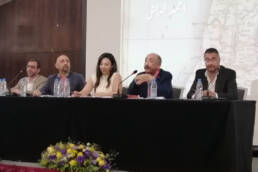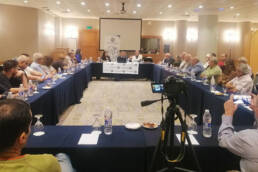The Center for Arab Unity Studies organized a panel discussion with the historian and political researcher Salman Abu Sitta on the book Britain’s Pacification of Palestine: The British Army, the Colonial State, and the Arab Revolt, 1936-1939 which was published by the Center. The panel discussion was held on Tuesday, May 9, 2023 in Beirut, in the presence of a group of researchers, academics, and others interested in the topic.
The panel discussion was presented by the Director General of the Center, Luna Abu Suwaireh, who emphasized the exploits of Abu Sitta in serving the Palestinian cause in a number of fields and forums. She also called for a minute of silence for the souls of the martyrs of Gaza since the seminar coincided with the start of a new Zionist war against Gaza. The coordinator of the “Thinking Unit” at the center, Muhammad Ballout, also submitted a review of the discussed book, mentioning two prominent problems within it. Ballout questioned the writer’s view of the British army’s response to the revolution as legal, with few exceptions only according to the writer, as Ballout said. He also criticized the writer’s view of holding the Palestinians responsible for depriving them of the land to establish a homeland alongside that of the Jews, because the writer considered them “lacking of realism in looking at the balance of power at that time”.
Abu Sitta talked deliberately about the British conspiracy against the Palestinians, considering that the occupation of Beersheba in 1917 constituted a milestone in the British control of Palestine, and paved the way for “Balfour Declaration” then the occupation of Jerusalem in December 2017. He reviewed the systematic Zionist practices and collective terrorism against the Palestinians during years of the revolution (1936-1939). Meanwhile the Palestinian villagers defended their lands bravely and by doing so they were able to turn a blind eye to the division of Palestine, according to Abu Sitta. The brutal practices included mass killings and massacres, the execution of the leaders of the revolution, the bombing of villages, the seizure of crops, and the imposition of fines that exceeded sometimes the annual income of families, leading to emptying of villages of their people and the destruction of Palestinian society by bringing families to deplorable economic conditions, as Abu Sitta explained. He also said that more than fifty percent of the Palestinian youth have been negatively affected by these practices and the impact ranged from killing, wounding, imprisonment, and difficult economic conditions. “The British forces colluded with the Zionists and abandoned their duty in protecting the Arabs, on the grounds that they are a mandate force that is supposed to protect the population”, said Abu Sitta, adding that the result was facilitating the mission of David Ben-Gurion in declaring Palestine a homeland for the Jews in 1948 without any significant resistance.
Abu Sitta stressed on a set of lessons that can be drawn from that historical era (1936-1939), because history is still repeating itself today, in terms of recruiting agents due to economic crises, recruiting political agents, or playing on sectarian tendencies and creating imaginary wars to divide the Palestinian people, calling for self-reliance first if Palestinians want foreign states’ support for their cause. Abu Sitta called for the election of a national council that expresses the spirit of resistance and the orientation of the new Palestinian generation.
The seminar also included various interventions from the attendees. Some stressed on the distinction between Arab populations, and some Arab Regimes that conspired against the Palestinian Cause; and others stressed on the importance of digital and social media in to consolidating the Palestinian memory in the minds of the rising generations. At last, Abu Sitta concluded the dialogue by inviting everyone to do one thing every day for Palestine, no matter how small.
The book Britain’s Pacification of Palestine: The British Army, the Colonial State, and the Arab Revolt, 1936-1939 was published by the Center in November 2021, written by Mattew Hughes and translated by Musab Bashir.
مركز دراسات الوحدة العربية
فكرة تأسيس مركز للدراسات من جانب نخبة واسعة من المثقفين العرب في سبعينيات القرن الماضي كمشروع فكري وبحثي متخصص في قضايا الوحدة العربية
We appreciate your support
SUPPORT THE CENTRE FOR ARAB UNITY STUDIES
The Centre is reaching out for its friends and readers for support, whether by ordering our publications and paying for them in hard currency, or through donations. The Centre welcomes any support to boost its resiliency, to ensure its survival, the continuation of its legacy and its commitment to tackle issues facing the Arabs and the Arab world.



